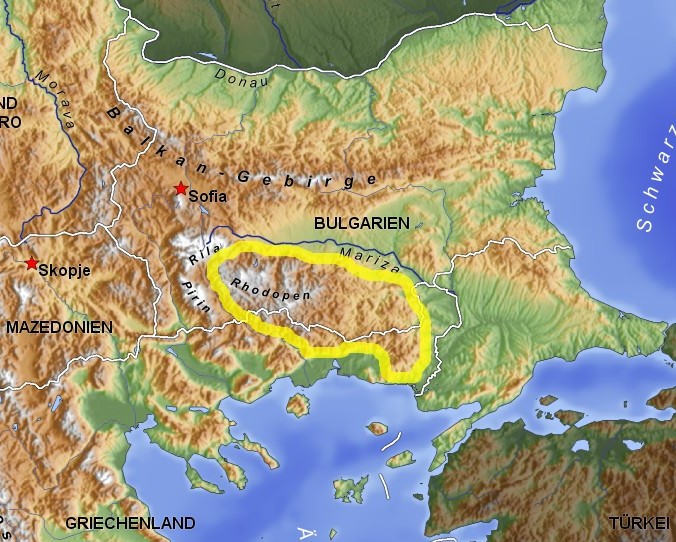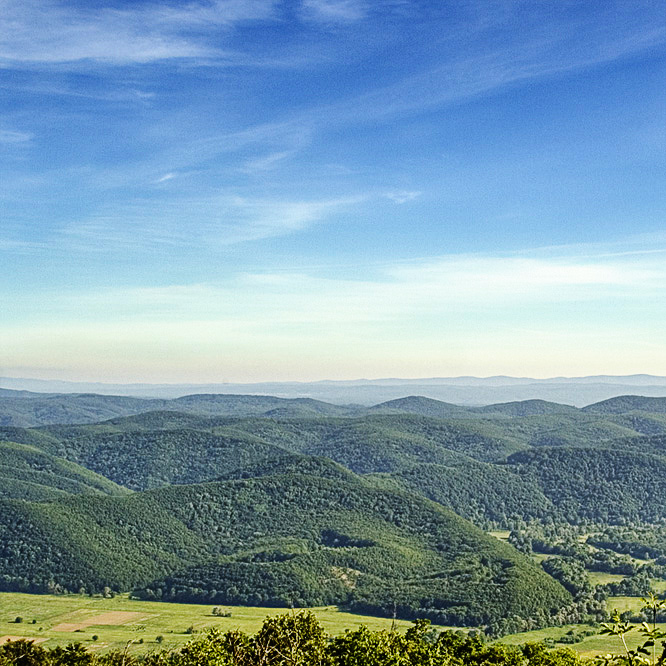|
Balkan Dialects
The Balkan dialects are the most extensive group of dialects of the Bulgarian language, covering almost half of the present-day territory of Bulgaria. Their range includes north-central Bulgaria and most of the Bulgarian part of Thrace, excluding the Rhodopes, the region of Haskovo and Strandzha. As a result of the mass population movements that affected eastern Bulgaria during the 19th and the beginning of the 20th century, the Balkan dialects are now spoken also in vast areas of northeastern Bulgaria, especially the regions of Dobrich and Varna. The most significant feature of the dialects, as in most Eastern Bulgarian dialects, is the pronunciation of Old Church Slavonic ѣ (yat) as or , depending on the character of the following syllable. The Balkan dialects, and in particular, the Central Balkan dialect The Central Balkan dialect is a Bulgarian dialect that is part of the Balkan group of the Eastern Bulgarian dialects. Its range includes most of north-central Bulgar ... [...More Info...] [...Related Items...] OR: [Wikipedia] [Google] [Baidu] |
Bulgarian Language
Bulgarian (, ; bg, label=none, български, bălgarski, ) is an Eastern South Slavic language spoken in Southeastern Europe, primarily in Bulgaria. It is the language of the Bulgarians. Along with the closely related Macedonian language (collectively forming the East South Slavic languages), it is a member of the Balkan sprachbund and South Slavic dialect continuum of the Indo-European language family. The two languages have several characteristics that set them apart from all other Slavic languages, including the elimination of case declension, the development of a suffixed definite article, and the lack of a verb infinitive. They retain and have further developed the Proto-Slavic verb system (albeit analytically). One such major development is the innovation of evidential verb forms to encode for the source of information: witnessed, inferred, or reported. It is the official language of Bulgaria, and since 2007 has been among the official languages of th ... [...More Info...] [...Related Items...] OR: [Wikipedia] [Google] [Baidu] |
Bulgaria
Bulgaria (; bg, България, Bǎlgariya), officially the Republic of Bulgaria,, ) is a country in Southeast Europe. It is situated on the eastern flank of the Balkans, and is bordered by Romania to the north, Serbia and North Macedonia to the west, Greece and Turkey to the south, and the Black Sea to the east. Bulgaria covers a territory of , and is the sixteenth-largest country in Europe. Sofia is the nation's capital and largest city; other major cities are Plovdiv, Varna and Burgas. One of the earliest societies in the lands of modern-day Bulgaria was the Neolithic Karanovo culture, which dates back to 6,500 BC. In the 6th to 3rd century BC the region was a battleground for ancient Thracians, Persians, Celts and Macedonians; stability came when the Roman Empire conquered the region in AD 45. After the Roman state splintered, tribal invasions in the region resumed. Around the 6th century, these territories were settled by the early Slavs. The Bulgars, ... [...More Info...] [...Related Items...] OR: [Wikipedia] [Google] [Baidu] |
Thrace
Thrace (; el, Θράκη, Thráki; bg, Тракия, Trakiya; tr, Trakya) or Thrake is a geographical and historical region in Southeast Europe, now split among Bulgaria, Greece, and Turkey, which is bounded by the Balkan Mountains to the north, the Aegean Sea to the south, and the Black Sea to the east. It comprises southeastern Bulgaria (Northern Thrace), northeastern Greece ( Western Thrace), and the European part of Turkey ( East Thrace). The region's boundaries are based on that of the Roman Province of Thrace; the lands inhabited by the ancient Thracians extended in the north to modern-day Northern Bulgaria and Romania and to the west into the region of Macedonia. Etymology The word ''Thrace'' was first used by the Greeks when referring to the Thracian tribes, from ancient Greek Thrake (Θρᾴκη), descending from ''Thrāix'' (Θρᾷξ). It referred originally to the Thracians, an ancient people inhabiting Southeast Europe. The name ''Europe'' first referred ... [...More Info...] [...Related Items...] OR: [Wikipedia] [Google] [Baidu] |
Rhodopes
The Rhodopes (; bg, Родопи, ; el, Ροδόπη, ''Rodopi''; tr, Rodoplar) are a mountain range in Southeastern Europe, and the largest by area in Bulgaria, with over 83% of its area in the southern part of the country and the remainder in Greece. Golyam Perelik is its highest peak at . The mountain range gives its name to the terrestrial ecoregion Rodope montane mixed forests that belongs in the temperate broadleaf and mixed forests biome and the Palearctic realm. The region is particularly notable for its karst areas with their deep river gorges, large caves and specific sculptured forms, such as the Trigrad Gorge. A significant part of Bulgaria's hydropower resources are located in the western areas of the range. There are a number of hydro-cascades and dams used for electricity production, irrigation, and as tourist destinations. In Greece, there are also the hydroelectric power plants of Thisavros and Platanovrysi. The Rhodopes have a rich cultural heritage including ... [...More Info...] [...Related Items...] OR: [Wikipedia] [Google] [Baidu] |
Haskovo
Haskovo ( bg, Хасково ) is a city in the region of Northern Thrace in southern Bulgaria and the administrative centre of the Haskovo Province, not far from the borders with Greece and Turkey. According to Operative Program Regional Development of Bulgaria, the urban area of Haskovo is the seventh largest in Bulgaria and has a population of 184,731 inhabitants. The number of inhabitants of Town of Haskovo is 67,086 people, according to the 2021 census.https://nsi.bg/bg/content/2975/%D0%BD%D0%B0%D1%81%D0%B5%D0%BB%D0%B5%D0%BD%D0%B8%D0%B5-%D0%BF%D0%BE-%D0%BE%D0%B1%D0%BB%D0%B0%D1%81%D1%82%D0%B8-%D0%BE%D0%B1%D1%89%D0%B8%D0%BD%D0%B8-%D0%BC%D0%B5%D1%81%D1%82%D0%BE%D0%B6%D0%B8%D0%B2%D0%B5%D0%B5%D0%BD%D0%B5-%D0%B8-%D0%BF%D0%BE%D0%BB The first settlement found in Haskovo is from circa 5000 BC. Haskovo celebrated its 1,000th anniversary as a town in 1985. To mark the event, a new clock tower was erected in the centre of the town. Haskovo Cove in Greenwich Island in the South Shetla ... [...More Info...] [...Related Items...] OR: [Wikipedia] [Google] [Baidu] |
Strandzha
Strandzha ( bg, Странджа, also transliterated as ''Strandja'', ; tr, Istranca , or ) is a mountain massif in southeastern Bulgaria and the European part of Turkey. It is in the southeastern part of the Balkans between the plains of Thrace to the west, the lowlands near Burgas to the north, and the Black Sea to the east. Its highest peak is Mahya Dağı ( bg, Махиада, ''Mahiada'') () in Turkey, while the highest point on Bulgarian territory is Golyamo Gradishte ( bg, Голямо Градище) (). The total area is approximately . The name of the massif allegedly derives from Istranca, the former name of the municipality of Binkılıç in Çatalca district, Istanbul province. Geography and climate The climate of the area is considerably influenced by the Black Sea and is predominantly humid continental in the mountains and humid subtropical at the coast. Major rivers in the area are the Veleka ( long) and the border river Rezovska ( long). Strandzha Na ... [...More Info...] [...Related Items...] OR: [Wikipedia] [Google] [Baidu] |
Dobrich
Dobrich ( bg, Добрич ; ro, Bazargic, tr, Hacıoğlu Pazarcık) is the List of cities and towns in Bulgaria, 9th most populated city in Bulgaria, the administrative centre of Dobrich Province and the capital of the region of Southern Dobrudzha. It is located in the northeastern part of the country, 30 km west of the Bulgarian Black Sea Coast, not far from resorts such as Albena, Balchik, and Golden Sands. In January 2012, Dobrich was inhabited by 79,269 people within the city limits. The city is named after the Bulgarian medieval lord of the surrounding region - Dobrotitsa. Agriculture is the most developed branch of the economy. Dobrich Knoll on Livingston Island in the South Shetland Islands, Antarctica is named after Dobrich. A point of interest is the Dobrich TV Tower. Etymology The city is named after the 14th-century Dobrujan ruler Dobrotitsa, from the Slavic root ''dobr'', "good". The city has had several name changes throughout its history. When the town wa ... [...More Info...] [...Related Items...] OR: [Wikipedia] [Google] [Baidu] |
Varna, Bulgaria
Varna ( bg, Варна, ) is the third-largest city in Bulgaria and the largest city and seaside resort on the Bulgarian Black Sea Coast and in the Northern Bulgaria region. Situated strategically in the Gulf of Varna, the city has been a major economic, social and cultural centre for almost three millennia. Historically known as ''Odessos'' ( grc, Ὀδησσός), Varna developed from a Thracian seaside settlement to a major seaport on the Black Sea. Varna is an important centre for business, transportation, education, tourism, entertainment and healthcare. The city is referred to as the maritime capital of Bulgaria and has the headquarters of the Bulgarian Navy and merchant marine. In 2008, Varna was designated as the seat of the Black Sea Euroregion by the Council of Europe. In 2014, Varna was awarded the title of European Youth Capital 2017. The oldest gold treasure in the world, belonging to the Varna culture, was discovered in the Varna Necropolis and dated to 4600 ... [...More Info...] [...Related Items...] OR: [Wikipedia] [Google] [Baidu] |
Central Balkan Dialect
The Central Balkan dialect is a Bulgarian dialect that is part of the Balkan group of the Eastern Bulgarian dialects. Its range includes most of north-central Bulgaria (without the regions of Dryanovo and Elena), as well as the regions of Karlovo, Kazanlak and Plovdiv in southern Bulgaria, all the way down to the northernmost ridges of the Rhodopes. As a result of the mass population movements that affected eastern Bulgaria during the 19th and the beginning of the 20th century, the Central Balkan dialect is now spoken also in vast areas of northeastern Bulgaria. The most significant feature of the dialect is the pronunciation of Old Church Slavonic ѣ (yat) as or , depending on the character of the following syllable. The Central Balkan dialect lies at the foundation of formal Bulgarian. However, it is not identical to the standard language because many of its features derive from the Western Bulgarian dialects, including the Macedonian dialects, or are a compromise between E ... [...More Info...] [...Related Items...] OR: [Wikipedia] [Google] [Baidu] |
Bulgarian Dialects By Todor Bozhinov
Bulgarian may refer to: * Something of, from, or related to the country of Bulgaria * Bulgarians, a South Slavic ethnic group * Bulgarian language, a Slavic language * Bulgarian alphabet * A citizen of Bulgaria, see Demographics of Bulgaria * Bulgarian culture * Bulgarian cuisine, a representative of the cuisine of Southeastern Europe See also * * List of Bulgarians, include * Bulgarian name, names of Bulgarians * Bulgarian umbrella, an umbrella with a hidden pneumatic mechanism * Bulgar (other) * Bulgarian-Serbian War (other) {{disambiguation Language and nationality disambiguation pages ... [...More Info...] [...Related Items...] OR: [Wikipedia] [Google] [Baidu] |





